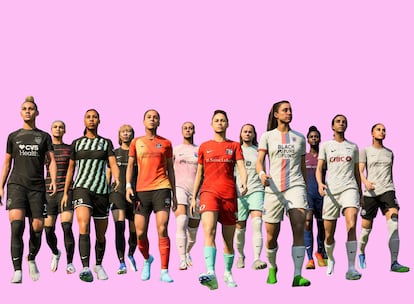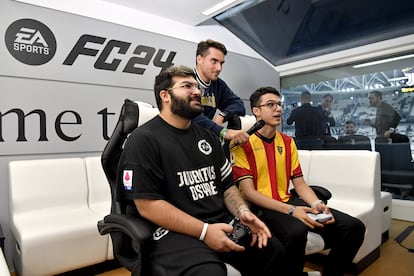Machismo in soccer video games: What’s behind the criticism of female players in the new edition of ‘FIFA’?
The increase in the number of women in ‘EA Sports FC 24′ has provoked the ire of streamers, who complain that it is unrealistic. Female experts and footballers warn that this isn’t the problem

Soccer is not exempt from machismo; nor are the video games that simulate it. In its new edition, EA Sports FC 24 — known as FIFA — allows for building mixed teams to play online against other players, which has prompted criticism from streamers like Xokas and Grefg. In particular, they lament the game’s “lack of realism”: this year, female players’ scores within the game universe are higher than in past editions; they are now on par with the best male soccer players. The streamers also claim that women’s inclusion has been “forced” by “putting them on the same level as men.” In the game’s online mode, where users create their own teams, it is now more likely that they will be offered female players, although it does not require teams to have a minimum number of women.
This online mode, called Ultimate Team, allows you to create your own squad through player cards; each player has been assigned a rating from 1 to 100, which is the average of all the points received for attributes like physique, shots on goal and passes. Players must complete challenges to earn coins, with which they can then sign better players. One is the manager of one’s own team. This mode even allows for playing with deceased soccer players, such as Pelé and Maradona, as well as for positioning goalkeepers as strikers. There are special cards that enhance the attributes of in-form players. As has now been demonstrated, international streamers also despise receiving a female player’s card, even if she has higher scores than a male player, despite the fact that users do not have to put her on their teams.
“Ultimate Team is not, nor has it ever been, a realistic game dynamic. Attaching numbers to attributes like passing or dribbling is totally arbitrary,” says Andrea Menéndez, author of 13, a novel about women’s soccer, and the editor-in-chief of the website Futboleras.es, one of the leading Spanish women’s soccer media. “What does it matter if those cards are Alexia Putellas or Haaland if your only objective is to win a match in a video game?” asks Menéndez, who is also a streamer (and EA Sports player). “Why do we think it’s good that a player from the Asian league has better stats than a player from a European league, if the competitive environment is not the same? The answer is very simple, and it has nothing to do with making the game realistic.”
According to Elisa Brey, professor of sociology and political communications at the School of Information Sciences at the Complutense University of Madrid, the reaction in streams and on social media to the presence of women in the game is dangerous. “They exaggerate what is happening and, when things go viral, sometimes they become more important than they should be,” she points out. In her opinion, these prejudices stem from society’s macho conception of seeing and imagining women in sports. EA Sports has not responded to EL PAÍS’ questions about this controversy.

Soccer player Maryame Atiq Ez-zity, of Dux de Logroño in the women’s second division who was called up to the Moroccan women’s national team, says that “the female comparison is made in terms of women’s soccer.” She observes that “it is a video game that simulates the sport. There are millions of actions that the simulated players do that are not real and that the elite players do not practice.” In this sense, TikToker Sergio Bolaños, known as Peldanyos, points out that “in older editions of soccer games you could even play on top of an ostrich. It’s a video game; it doesn’t have to be realistic for a women’s team to beat a men’s team.”
All the sources consulted for this article applaud EA Sports’ decision to make professional female soccer players more visible. “The fact that female role models appear in any natural environment where male role models are already present is vital so that girls feel seen and want to be footballers,” Menéndez stresses. Atiq Ez-zity agrees: “When there is no visibility, we grab hold of all those platforms that make us reach the homes of those girls who have a dream. Those role models push them to follow [their dream] and work for it. We are role models for many, and we want to reach many more and break taboos.”
“Why is it so hard for us to understand that their female colleagues must occupy the same position in order to achieve the same goals? I grew up with Zamorano and Amavisca as role models, with Laudrup, with Ronaldo. Now girls know that women play soccer; they want to be Aitana [Bonmatí] and win a Golden Ball like she will in a few weeks,” adds Andrea Méndez.
That message resonates with younger people. Lucía Fernández, a 17-year-old amateur player in Spain, elaborates: “Many of the players I see now in video games have been my role models and idols since I was a child. I grew up watching them play soccer, and they awakened that passion in me.” Asked if she has ever been impugned for being a girl when playing soccer or video games, she is clear: “Yes, I am often undervalued for the simple fact of being a girl. By people who don’t know me. After all, it’s a stereotype that goes way back.”
‘A threat to masculinity’
As Elisa Brey notes, the fact that many streamers and users criticize female gamers so harshly has to do with the fact that “the classic masculinity in which men have an advantageous position feels threatened.” The Complutense University professor says: “We are facing a situation of equity, not of superiority or an imposition of women, and the response has been negative.” She also reminds us that, until recently, video games showed women in “a secondary role, as a damsel in distress to be saved, as an enemy or as a prize and even hypersexualized.”
The researcher also believes that the fact that misogynistic comments are being made on computers is important: “When these people are streaming or tweeting, they have no one next to them to tell them that it’s wrong. They act very impulsively and thoughtlessly. The digital world is not always an extension of what happens in the physical world.” She also emphasizes that “communities tend to self-reproduce. These guys will be followed by groups that see them as similar [to themselves].”
She maintains that the feminist reaction to the Luis Rubiales case — in which he kissed Spanish soccer player Jenni Hermoso without her consent following the team’s World Cup victory — is also “crucial” for denouncing such attitudes. “Things are changing thanks to the fact that women footballers have not given up on pursuing that change,” says Andrea Méndez. She emphasizes that we must “make it clear that women’s soccer has to be respected like other sports.”
Both experts see it as dangerous that streamers and content creators with large followings talk about female soccer players this way on their social media pages. “The conversation is a reflection of the streamer. Children are very impressionable and will always behave like those they follow do,” says Méndez. She emphasizes that “those of us who are behind the [computer] screen also educate young people; it is important to take responsibility for the content we generate.”
Pay to win
Electronic Arts, the company that owns the FIFA video game franchise, is listed on NASDAQ, the second-largest automated electronic stock exchange in the United States. According to a report from the company itself, the net revenue from sales of extra content for Ultimate Team was $4.04 billion between 2018 and 2020. They also realize that this game mode is their most popular online content.
Players can pay to get cards with better players. For Galician streamer El Xokas, the inclusion of female players in this game mode also has to do with Electronic Arts’ economic interests: “It’s not realistic at all. They are not doing it for inclusion; they are doing it to sell more envelopes. To get Haaland, you have to buy twice as many packs, because there are twice as many cards, that’s what they want,” he laments in one of his videos. However, the content creator does not appreciate the possibility that it can be useful to get cards with high ratings from female players.
This style of play is known as pay to win. “It is clear that EA is a company and has its own economic interests in mind. They want to make more money and clean up their moral image and get more sales because they see that women’s soccer can be profitable,” Brey points out. But ultimately, she observes, “if they raise visibility and can help reduce the inequalities between men and women, that can be celebrated.”
Sign up for our weekly newsletter to get more English-language news coverage from EL PAÍS USA Edition
Tu suscripción se está usando en otro dispositivo
¿Quieres añadir otro usuario a tu suscripción?
Si continúas leyendo en este dispositivo, no se podrá leer en el otro.
FlechaTu suscripción se está usando en otro dispositivo y solo puedes acceder a EL PAÍS desde un dispositivo a la vez.
Si quieres compartir tu cuenta, cambia tu suscripción a la modalidad Premium, así podrás añadir otro usuario. Cada uno accederá con su propia cuenta de email, lo que os permitirá personalizar vuestra experiencia en EL PAÍS.
¿Tienes una suscripción de empresa? Accede aquí para contratar más cuentas.
En el caso de no saber quién está usando tu cuenta, te recomendamos cambiar tu contraseña aquí.
Si decides continuar compartiendo tu cuenta, este mensaje se mostrará en tu dispositivo y en el de la otra persona que está usando tu cuenta de forma indefinida, afectando a tu experiencia de lectura. Puedes consultar aquí los términos y condiciones de la suscripción digital.








































